If you’re anything like us here at Steamy Kitchen, you probably love tea too. In fact, you might have a whole stash of bagged teas in a cupboard or maybe jars of loose leaf teas proudly displayed on your counter. And though you often enjoy them, you can’t help but wonder about ultimate question: How long do these lovely little leaves actually last?
Know that you’re not alone. No matter if you’re a tea lover who’s amassed a collection that would make the Queen of England jealous, or a casual sipper with a couple of tins, it’s crucial that you know the shelf life of your tea. So, grab your favorite cup of tea (ours is a peachy blend, but you do you), and let’s dive into the leafy mysteries of tea storage.
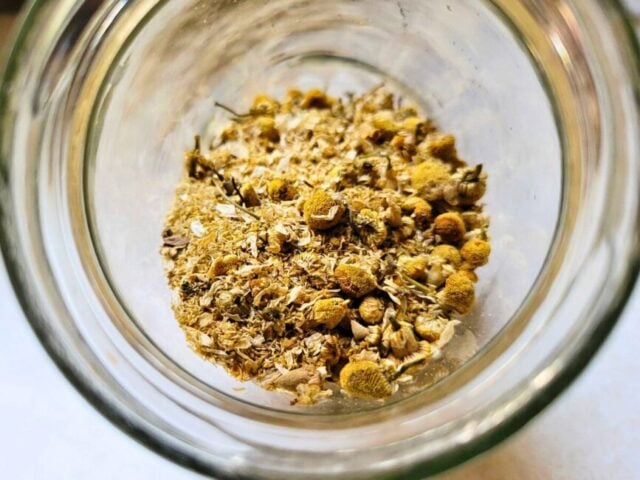
How Long Do Tea Leaves Last?
The Short Answer
The lifespan of tea leaves depends on the type of tea and how you store them. As a general rule of thumb, most loose tea leaves can last from 6 months to 3 years if stored properly. That’s a big range, we know, but different teas have different shelf lives. Let’s break down the lifespan of each tea, shall we?
The Long Answer
Here’s the info on how long each type of tea lasts:
- White Tea and Green Tea: These teas are rather delicate divas, because they have a shorter shelf life than most teas. White tea and green tea is best enjoyed the first year that you have them, though some claim aged white tea to last up to 24 months, while properly-stored green tea can last up to 18 months.
- Oolong Teas: Oolong teas last about 6 months to 2 years, depending on the type. Less oxidized oolong teas like Ali Shan should be enjoyed sooner, while heavier oxidized teas like Bai Hao can last a bit longer.
- Black Tea: Black tea leaves, with their full oxidation, can last for 2 to 3 years.
- Pu-erh Teas: The fine wine of the tea world, Pu-erh only gets better with age! They can last for decades, and in rare cases, even centuries! Some pu-erh drinkers buy young, raw pu-erh and leave it in their pantry for many years.
- Herbal Teas: While herbal teas are technically not considered “tea” since they don’t come from the Camellia sinensis plant, they’ll generally last about 1 to 2 years. This shelf life can vary depending on the specific herbs and flowers they contain.
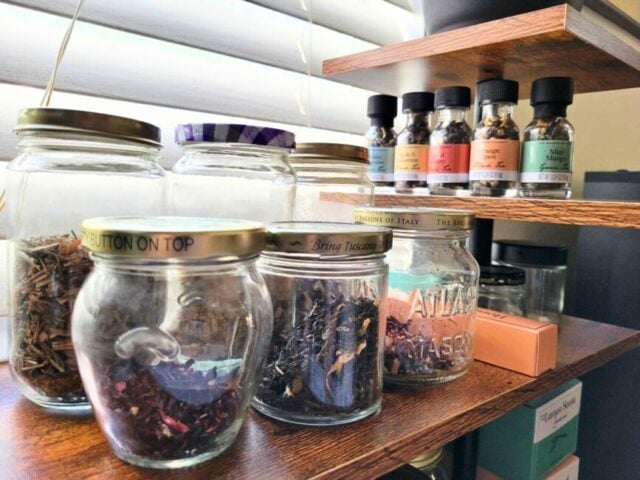
Factors That Affect the Life of Tea Leaves
Proper Storage
To make sure your tea leaves last as long as possible, be sure to store them properly. Keep them in an airtight container, such as a tea tin or a mason jar, and put them in a cool, dark place. Avoid keeping them around high temperatures and direct sunlight, as well as any strong odors that could affect their flavor.
Air Exposure and Oxidation
Fresh tea’s greatest enemy? Air. The more air your tea is exposed to, the faster it will lose its essential oils and its flavor. This is why airtight containers are the way to go. Delay the oxidation process to keep your tea lasting longer.
Type of Tea
As we talked about earlier, the type of tea you have plays a big role in how long your tea leaves will stay fresh.
Temperature and Humidity
Tea leaves should be stored at room temperature and kept in a dry place. High temps and humidity can lead to mold and spoilage.
Quality of Tea
Of course, the initial quality of your tea leaves will affect how long they last. High-quality tea leaves have more natural oils and robust flavors, which means they’ll have a longer shelf life than lower-quality teas.
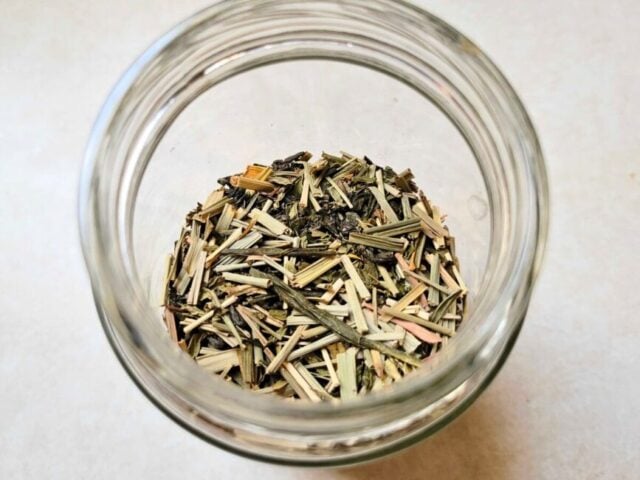
How to Tell if Tea Leaves Have Gone Bad
Find a forgotten tea bag at the back of your pantry? Wondering if it’s still good? Don’t worry, it happens to the best of us. Though drinking expired tea isn’t necessarily harmful, here’s how to determine if your tea leaves have gone bad:
Check the Smell
Give it the ol’ sniff test. Fresh tea, especially loose-leaf, should have a strong scent. If it smells stale, musty, or has no scent at all, the essential oils have left the building and the tea has lost its potency. This goes for all types of tea.
Take a Look at the Color and Texture
Time to use your peepers. Fresh tea leaves usually have a vibrant color. If they’re discolored, faded, or appear to have white spots (a sure sign of mold), we recommend you toss them.
Taste Test
Good tea should have its original flavor. If your tea tastes flat, bitter, or weird in any way, it’s past its prime. Over time, aged tea like raw pu’erh can develop more complex flavors, but old tea that wasn’t meant to age is just expired tea.
Check for Pests
If your storage conditions were compromised, then you might find some unwanted guests in your tea leaves. Look for any insects or droppings in your tea, and if you see any, it’s definitely time to toss it.
Look at the Expiration Date
While most teas don’t have an expiration date, checking for any date on the packaging will give you an idea of how long you’ve had it.
Signs of Moisture
Moisture is another arch-nemesis to tea, so if you notice any signs of moisture in your tea leaves, spot clumping or smell a wet smell, toss immediately.
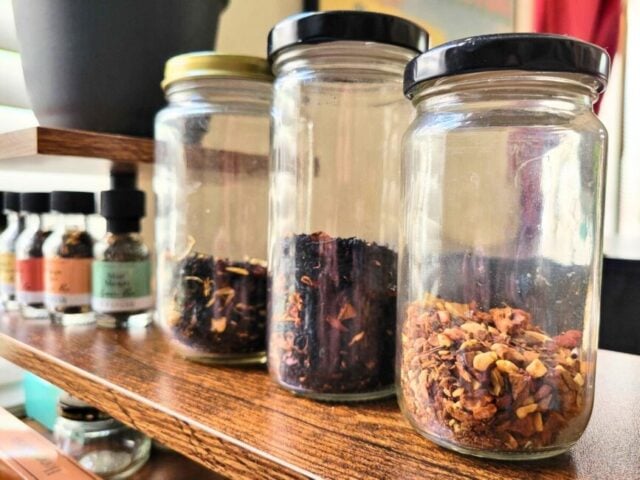
More Tips for Tea Drinkers
- Smaller Quantities: If you’re worried about your tea lasting, or if you only drink tea sporadically, be sure to buy your tea in smaller quantities so you’ll be more likely to use it up before it goes bad.
- Surface Area: Loose-leaf tea has a greater surface area that’s exposed to air than tea in tea bags, and that can affect shelf life. Be sure to keep your loose leaves in an airtight container.
- Health Benefits: Fresh tea means more health benefits. The older your tea, the less beneficial properties, so drink up!
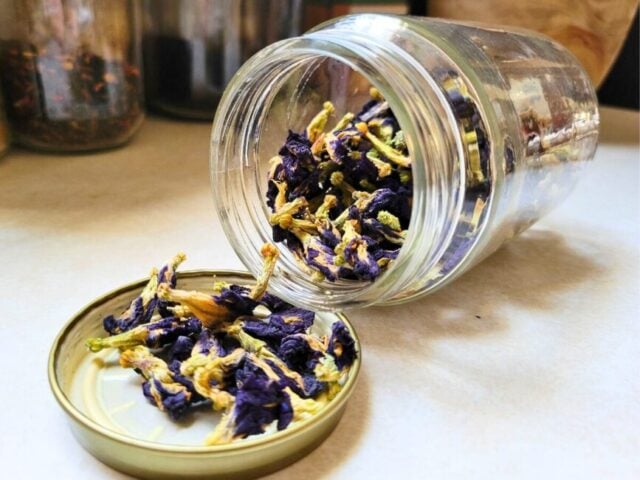
It’s Tea Time!
All this talk of tea has made us thirsty. We’re gonna go enjoy a cuppa right now!
There are 2 types of people in the world: those who get tea, and those who don’t. For those of us who do, we understand that it’s more than just a beverage. It’s a ritual. A moment of peace. An invitation of calm. It’s an opportunity for mindfulness, maybe gratitude, or perhaps just quiet. Whatever it is for you, I think we can all agree that tea is an experience and a chance to savor the moment.
What about you? What do you love about tea? Do you have a favorite tea? Do you enjoy loose leaf or bags? Is herbal your go-to, or are you a connoisseur of finer black or pu-erh teas?
Whatever you enjoy, tell us in the comments! Be sure to include any tips for tea additions that you find yummy and what foods you enjoy with tea (if any). We always love to hear about it.





